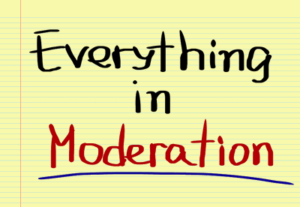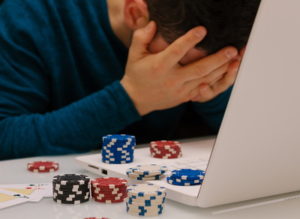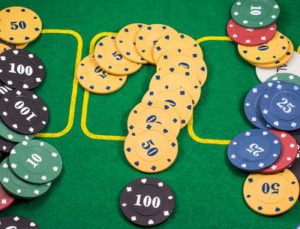 In essence, the marginal utility of goods or services is how much pleasure or satisfaction you gain from it. The theory of the diminishing marginal utility is that the longer something goes on for, the less people will enjoy it.
In essence, the marginal utility of goods or services is how much pleasure or satisfaction you gain from it. The theory of the diminishing marginal utility is that the longer something goes on for, the less people will enjoy it.
In other words, if you place bets on a regular basis then you will soon find yourself in a situation where you get less enjoyment out of it than you did before. As a result, you might need to place more bets or larger bets or bet on stranger things in order to get the same level of enjoyment out of it that you did originally.
Imagine a scenario in which you enjoy eating French fries. The second, third and fourth French fry that you eat will give you more satisfaction than those before it. Your marginal utility from eating French fries will be positive, but that can change if you keep eating French fries and begin to feel sick from doing so.
This will make your marginal utility negative, which is what happens when an over-consumption of something results in it doing more harm than good. The law of diminishing marginal utility means that each subsequent use of things offers less enjoyment.
Marginal Utility Explained
 Marginal utility is, in essence, a phrase that is used to mean how much enjoyment we get out of something. Diminishing marginal utility, therefore, refers to the manner in which something becomes less enjoyable the longer it goes on.
Marginal utility is, in essence, a phrase that is used to mean how much enjoyment we get out of something. Diminishing marginal utility, therefore, refers to the manner in which something becomes less enjoyable the longer it goes on.
You might love chocolate and think that the third piece is nicer than the first piece was, but by the time you get to the 20th bite you’re feeling a bit sick. Not only has nothing been added to the experience of eating the chocolate by the time that the 20th bite comes around, but you’re actually making your enjoyment of it worse.
In psychology, there is a link between marginal utility and the likes of the hedonic adaptation and affective habituation. To put it more simply, people adjust their experiences so that having repeated exposure to the same stimulus becomes less potent.
In essence, humans acclimate to what is happening, meaning that the novelty of something soon wears off. Smokers will know this experience, getting less enjoyment from their 200th cigarette than their first, but continuing to smoke in the hope that that will lead them to re-find the joy that they previously experienced.
Diminishing Marginal Utility & Gambling
 You might well be reading this and wondering what, exactly, the law of diminishing marginal utility has to do with gambling. The answer comes in the form of how self-control tends to play out.
You might well be reading this and wondering what, exactly, the law of diminishing marginal utility has to do with gambling. The answer comes in the form of how self-control tends to play out.
Winning the lottery won’t result in someone’s happiness being permanently increased, but rather their point of reference for happiness being moved. Now the stimulus that someone needs to achieve is significantly increased compared to what it was before. The question then becomes about whether or not people that gamble get less satisfaction the longer it is that they gamble for.
In other words, someone that has been gambling for ten hours, say in a casino or poker room, will be getting less pleasure for every win than someone that has only gambled for a quarter of an hour. The law of diminishing marginal utility means that they need to bet more in order to get the same level of ‘hit’ that they would have been getting at the start of their gambling.
The longer you do something, the more that you need to change what it is that you’re doing in order to get the same level of enjoyment out of it.
Gambling Is Like Any Other Hedonistic Pleasure
 The reality is that gambling is akin to any other vice. It is something that most people think is about enjoyment, with only professionals doing it because they think that they’re going to earn money from it. Everyone else might hope to win money, but the truth is that all forms of gambling are set up in such a way that it is only the ones offering the gambling that are certain to make a profit. As a result, bettors that take part in such an activity are liable to need to increase their risk in order to ensure that they can have some enjoyment.
The reality is that gambling is akin to any other vice. It is something that most people think is about enjoyment, with only professionals doing it because they think that they’re going to earn money from it. Everyone else might hope to win money, but the truth is that all forms of gambling are set up in such a way that it is only the ones offering the gambling that are certain to make a profit. As a result, bettors that take part in such an activity are liable to need to increase their risk in order to ensure that they can have some enjoyment.
Imagine a smoker that feels as though they’re not getting the same hit from a cigarette that they were when they first started smoking. In order to get a better hit, they might have to smoke more often. If that still doesn’t give them satisfaction, they might decide to move on to smoke marijuana or another, harder drug.
Before too long, they’ve lost all sense of control over the habit that started as one thing but became something else thanks to the law of diminishing marginal utility and over time they will not know how to fix that.
Why It Matters
 An obvious question to ask is why it is that this matters. How often you gamble and how much you win can influence how much more often you gamble and how much you’ll need to win to get enjoyment out of it.
An obvious question to ask is why it is that this matters. How often you gamble and how much you win can influence how much more often you gamble and how much you’ll need to win to get enjoyment out of it.
As an example, someone first beginning betting might be delighted to turn £1 into £2, but after months of betting will be a lot less impressed at turning £100 into £101. In both cases they have increased their lot by £1, but in the second instance that is a lot less impressive than the first. In order to take the same level of joy out of it, they would need to double their money.
This, of course, increases the risk that they’re taking. That, in essence, is why the law of diminishing marginal utility matters in the world of gambling. If you’re taking increased risk then there is a likelihood that you’re going to develop a problem with gambling.
Getting less satisfaction from something will lead to people increasing their risk in the hope that this will increase their enjoyment, in spite of the fact that this is demonstrating dangerous behaviour. This, in turn, will make it more likely that you’ll lose more money, which is the opposite of what you wanted to achieve.
To avoid the effects of diminishing marginal utility you can follow the old adage of ‘everything in moderation’. If you gamble every day you will likely be suffering from diminishing marginal utility but if you bet occasionally on things you are interested in you might be able to preserve the same enjoyment level over time.
This applies to all walks of life not just gambling, in effect anything where over consumption can be bad for us.
